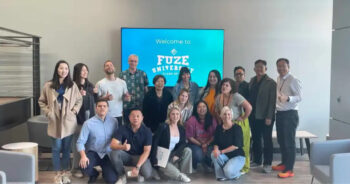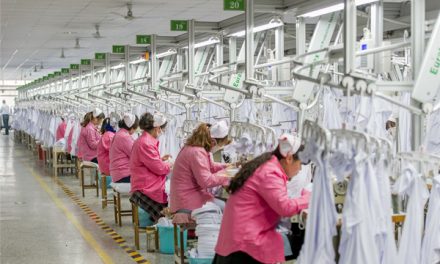 The market for sustainable fabrics is closing in on $69.5 billion by 2030, according to a report by Market Research Future. Along with this, brands are also looking at clean and chemical-free finishes to control odors and manage moisture. To meet this demand and educate brands, Fuze Technologies has launched “Fuze University” as a regular event at its recently expanded headquarters in Salt Lake City.
The market for sustainable fabrics is closing in on $69.5 billion by 2030, according to a report by Market Research Future. Along with this, brands are also looking at clean and chemical-free finishes to control odors and manage moisture. To meet this demand and educate brands, Fuze Technologies has launched “Fuze University” as a regular event at its recently expanded headquarters in Salt Lake City.
The biotech firm’s Fuze solution can be applied to surfaces and textiles to combat mold, communicable diseases and the bacterial growth that commonly causes odors. Free of chemicals, Fuze is misted onto the surface or fabric that needs permanent treatment, either by producers in the factory or by consumers themselves.
“Fuze is a fantastic solution for brands and mills looking to increase apparel and textile performance while cutting down on their use of dangerous and polluting chemicals,” Andrew Peterson, chief technology officer of Fuze Technologies, said. “With demand increasing rapidly, it became apparent that hosting our partner brands here in Salt Lake City was necessary to keep everyone up to speed on our latest tech and how best to leverage it.”
The week-long educational and networking summit took place in September and saw over 100 mills, brands and manufacturers in attendance, including representatives from Latin America, Europe and across Asia from customers including Active Apparel Group, Global Shine Trading Co., Ltd, portance, Texwell Textile, WTS – World Textile Sourcing, Inc., and Fuze Technologies Asia.
“Our objective is to hold Fuze University twice a year—Q1 and Q3—to address industry topics that are top of mind for our partners because they are top of mind for customers,” Peterson said.
The summit proved that face-to-face training and personal interactions “make all the difference,” Peterson said. Fuze University equipped partners with the information and training they need to effectively implement Fuze technologies within their own products, mills and facilities. An added bonus, Peterson continued, was the global business connections and relationships forged during the event.
“Fuze University is designed to address the topics that are central to Fuze and our partners,” Peterson said. “Antibacterial odor control, sustainability, extending the life of garments, recyclability and real solutions to the challenges facing brands and mills wanting chemical-free, non-toxic solutions that are better for humanity and better for the environment.”
The next installment of Fuze University is planned for March 4-8, 2024, at the company’s headquarters. These gatherings are free for current or potential customers and factories.
“Next year’s curriculum will expand on the foundation laid in 2023 by inviting industry leaders to present who share the same values and commitment to our customers,” Peterson said. “Our customers require the industry to turn away from the old-school chemical-infused ways of treating garments to new processes and new technological innovations shared at Fuze University.”
In May, Fuze expanded its headquarters to a 66,000-square-foot flagship and production facility in Utah’s capital, allowing the biotech company to produce 10 times as much of its antibacterial solution that prevents and protects against pathogens.













